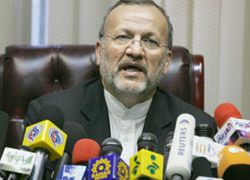Iran threatens to end snap UN checks
Manouchehr Mottaki, Iran’s foreign minister, has said Iran will end snap inspections of its facilities by UN monitors as of Saturday if the country is reported to the Security Council.

Speaking on Iranian television on Tuesday, Mottaki appeared to be anticipating a session of the International Atomic Energy Agency’s 35-nation board of governors in Vienna, Austria, on Thursday, where Iran’s nuclear programme may be reported to the Security Council.
“Reporting or referring Iran to the UN Security Council is of equal weight. If it happens, the government will be required under the law to end the suspension of all nuclear activities it has voluntarily halted,” Mottaki said.
“The first victim will be the additional protocol (intrusive inspections). If it happens, Iran will definitely terminate its cooperation (with the IAEA) as of Saturday, 4 February,” he said.
Despite Iran’s tough line in the face of the Big Five powers’ threat to put it before the Security Council, Iran signalled its willingness to co-operate over its nuclear programme.
Black-market document
Teheran provided the UN watchdog this week with an extensive document obtained by Iran on the nuclear black market that the IAEA said served no other purpose than to make an atomic warhead.
The documents were handed over in an apparent last-minute attempt to stay out of the Security Council, according to diplomats in Vienna.
 |
|
Rice (C) is leading international |
The one-and-a-half-page document describes how to cast fissile uranium into the hemispherical shape of warheads, diplomats in Vienna said, speaking on condition of anonymity in exchange for revealing the confidential information.
Iran said it received the document from members of the nuclear black-market network. It claimed it did not ask for the document but was given it any way as part of other black-market purchases.
The finding is in a confidential report due for presentation to the 35-nation IAEA board when it meets on Thursday.
The report confirms information provided over the past few weeks by diplomats familiar with the Iran inquiry that Tehran has not started small-scale uranium enrichment since announcing its plan to do so earlier this month.
Interviews refused
The four-page IAEA report also criticises Iran for refusing to allow interviews with at least one nuclear scientist linked to the military, and dismissing requests for information on “tests related to high explosives and the design of a missile re-entry vehicle, all of which could have a military nuclear dimension”.
Nevertheless, on Tuesday the Europeans and Russians said the opportunity for negotiations was not lost, even after envoys from Britain, China, France, Russia and the US reached a deal in London overnight recommending that the IAEA report Iran to the Security Council.
|
“If it happens [reporting or referring Iran to the UN Security Council], the government will be required under the law to end the suspension of all nuclear activities it has voluntarily halted” |
The deal means the IAEA will almost certainly take the step in a vote on Thursday. But instead of taking immediate action on the IAEA report, the Security Council will wait until March, leaving time for last-ditch talks with Iran.
Earlier on Tuesday Mahmoud Ahmadinejad, the Iranian president, said: “In the case Iran is brought before the UN Security Council, the Islamic Republic of Iran will be obliged under the law passed by parliament to lift voluntary implementation of the Additional Protocol.”
Iran’s top nuclear negotiator, Ali Larijani, said a move to the council – whether notification or reporting – would “be unconstructive and the end of diplomacy”.
Iran’s assertion
Larijani also threatened a halt to the Additional Protocol and said: “We will have to start all nuclear work that has been voluntarily suspended.”
He stopped short of specifying that Iran will restart its uranium enrichment programme.
Iran insists its nuclear programme is peaceful and has no other purpose than to generate power.
A three-year IAEA investigation has not found firm evidence to back assertions by the US and others that Iran’s nuclear activities are a cover for an arms programme.
But it has not been able to dismiss such suspicions either.